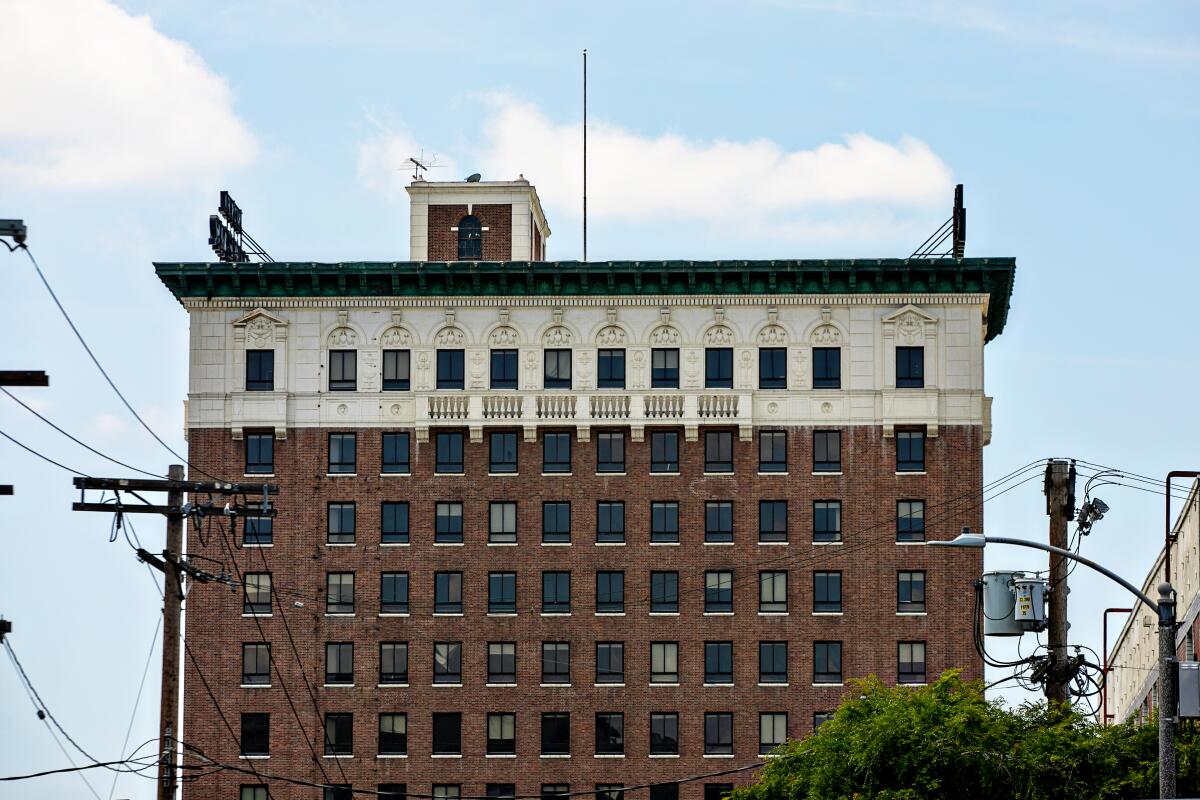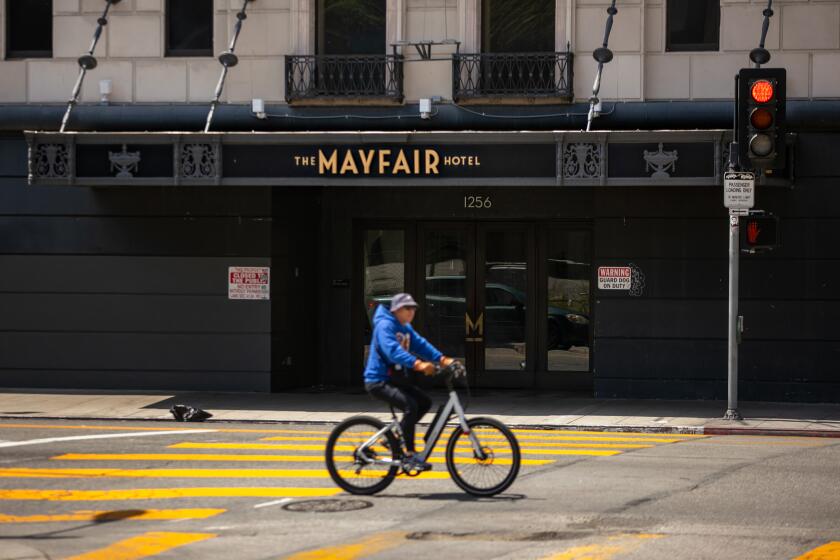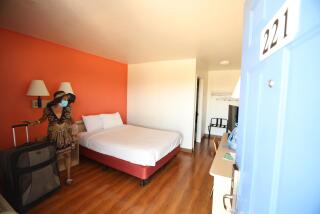L.A.’s $11.5-million damage payout to former homeless hotel won’t be used for repairs

- Share via
Faced with reports of wrecked furniture, torn up carpet and other types of damage, the city of Los Angeles recently paid $11.5 million to a boutique hotel used for two years as homeless housing.
That money won’t go toward any repairs in the building, even though the city is on the verge of acquiring the property, officials said this week.
The City Council is set to vote Friday to approve the purchase of the 294-room Mayfair Hotel, which will serve as a key part of Mayor Karen Bass’ fight against homelessness. In the run-up to that vote, city officials explained that the seller, Mayfair Lofts, won’t be obligated to use any of the $11.5 million in city damage payouts to repaint rooms, replace light fixtures or fix other parts of the building.
That information was delivered during a hearing Wednesday, after Councilmember Bob Blumenfield asked whether the seller would be required to provide receipts showing he had made repairs at the Mayfair in advance of the sale to the city.
“The $11 million in damages that was already paid for — did they actually fix, did they have to show receipts for actually fixing [the building]?” Blumenfield asked. “Or are we getting a building that has $11 million worth of damage?”
L.A. quietly paid the Mayfair Hotel $11.5 million to cover damage incurred when the building was homeless housing. Now, the mayor wants to buy the building.
Melody McCormick, assistant general manager for the General Services Department, responded by pointing out that the city agreed to certain terms when it leased the Mayfair for Project Roomkey, which provided rooms to unhoused Angelenos during the pandemic. That agreement required the city to restore the hotel to the condition it was in when Project Roomkey began at the hotel in July 2021, she said.
“We are buying the hotel in its ‘as is’ condition, meaning ... in its damaged state,” she told council members.
The Times reported Wednesday that the city received extensive reports of damage to the Mayfair during Project Roomkey, with building residents shattering windows, vandalizing bathrooms and in one case, punching a hole in a wall in the lobby. Project Roomkey workers also responded to overdoses, threatening behavior and violent acts, according to emails obtained by The Times.
The city plans to buy the Mayfair for $60 million and carry out an additional $23 million in renovations and upgrades. Bass plans to use the building, in the near term, as interim housing for homeless residents from Skid Row, some of whom are currently staying at the L.A. Grand Hotel. The city is leasing that building for nearly $4,700 per room per month.
The mayor’s proposal for the Mayfair has drawn strong support from nonprofit groups, particularly those working in Skid Row, which has the highest concentration of homeless people in the city. The plan is opposed by a number of people who live or work near the Mayfair, who say the city did a poor job of overseeing the facility when it was used as homeless housing during the pandemic.
Over the past four months, the city has made three payments to address damage claims at the Mayfair, according to City Controller Kenneth Mejia’s office. The final $6 million payment was paid Aug. 9, the controller’s office said.
Nearly a third of the city’s payout represents payments for furniture, including $310,000 worth of ottomans, $239,000 worth of nightstands and more than $940,000 in beds and mattresses, city officials said.
Although some damage at the Mayfair was confined to individual hotel rooms, other problems had repercussions for much of the building.
For example, in January 2022, a hotel manager informed officials with the Los Angeles Homeless Services Authority that a resident on the seventh floor had flooded a toilet “without telling anyone.” Water reached the lobby, causing a “major flood,” he wrote.
“Given it traveled seven floors to the lobby it might be costly,” McCormick responded in one email.
Get the lowdown on L.A. politics
Sign up for our L.A. City Hall newsletter to get weekly insights, scoops and analysis.
You may occasionally receive promotional content from the Los Angeles Times.
During this week’s hearings, McCormick told council members that the costs at the Mayfair were “an anomaly.” Other Project Roomkey sites generated much smaller damage claims, she said.
Unlike other Project Roomkey hotels, the Mayfair had high-end furniture and other expensive furnishings appropriate for a newly renovated boutique hotel, McCormick said. Once the city gains possession of the hotel, it won’t need to acquire furnishings that are anywhere near as fancy, she said.
“We’re not going to replace the $450 ottoman with another $450 ottoman,” she said.
Councilmember Eunisses Hernandez, who represents the neighborhood where the Mayfair sits, came out in favor of purchasing the hotel. But she also called for several measures to help the surrounding neighborhood, including an extra $400,000 in sanitation services.
Hernandez said she wants the mayor’s team to carry out an Inside Safe encampment operation within 30 days of the vote to purchase the Mayfair. She also called for the creation of a community advisory board to oversee the Mayfair’s operations.
Councilmember Monica Rodriguez argued against the hotel acquisition, saying the city’s fight against homelessness should not come at the expense of “prudent financial decisions.”
“To propose a rushed acquisition of a property we’ve paid $11 million in damages to repair, and take possession without repairs being completed, is not a deal I believe any taxpayer would view as too good to pass up,” she said.
More to Read
Sign up for Essential California
The most important California stories and recommendations in your inbox every morning.
You may occasionally receive promotional content from the Los Angeles Times.















